When it comes to how Artificial intelligence (AI) will affect our lives, the response from industry insiders, as well as the public, ranges from a sense of impending doom to heraldry. We do not yet understand the long-term trajectory of AI and how it will change society. Something, indeed, is happening to us—and we all know it. But what?
Gen Zers and Millennials are the most active users of generative AI. Many of them, it appears, are turning to AI for companionship. “We talk to them, say please and thank you, and have started to invite AIs into our lives as friends, lovers, mentors, therapists, and teachers,” Melissa Heikkilä wrote in MIT Technology Review. After analyzing 1 million ChatGPT interaction logs, a group of researchers found that “sexual role-playing” was the second most prevalent use, following only the category of “creative composition.” The Psychologist bot, a popular simulated therapist on Character.AI—where users can design their own “friends”—has received “more than 95 million messages from users since it was created.
According to a new Institute for Family Studies/YouGov survey of 2,000 adults under age 40, 1% of young Americans claim to already have an AI friend, yet 10% are open to an AI friendship. And among young adults who are not married or cohabiting, 7% are open to the idea of romantic partnership with AI.
A much higher share (25%) of young adults believe that AI has the potential to replace real-life romantic relationships. Furthermore, heavy porn users are the most open to romantic relationships with AI of any group and are also the most open to AI friendships in general.
1% of young adults claim to already have an AI friend, yet 10% are open to an AI friendship. A much higher share of young adults (25%) believe that AI has the potential to replace real-life romantic relationships.
In addition to AI and relationships, the new IFS survey also asked young Americans how they feel about the changes AI technology may bring to society. We find that their reactions to AI are divided. About half of young adults under age 40 (55%) view AI technology as either threatening or concerning, while 45% view it as either intriguing or exciting.
There are complex socio-economic findings, too, with young adults with lower incomes and less education being more likely than those with higher incomes and more education to fear how AI will affect society. At the same time, this group is more likely than their fellow Americans who are better off to be open to a romance with AI.
1 in 10 Young Adults Are Open to AI Friends
When asked about the prospect of having an AI friend designed to simulate human interaction and provide emotional support, just over half of American young adults (57%) say that they are either against it for ethical reasons or just not comfortable with it. In contrast, 1 in 10 young adults (11%) are open to having an AI friend, with 1% already having one. Another one-third of young adults (32%) either have mixed feelings about AI friendships or are unsure whether they would befriend a chatbot. This large mixed/unsure group represents the possibility of a significant increase in users in future years.
Further analysis reveals some key demographic differences. Men are more open to AI friendships than women (13% vs. 9%). Liberals show greater openness compared to conservatives (14% vs. 9%), with conservatives more likely to express discomfort or opposition to the idea.
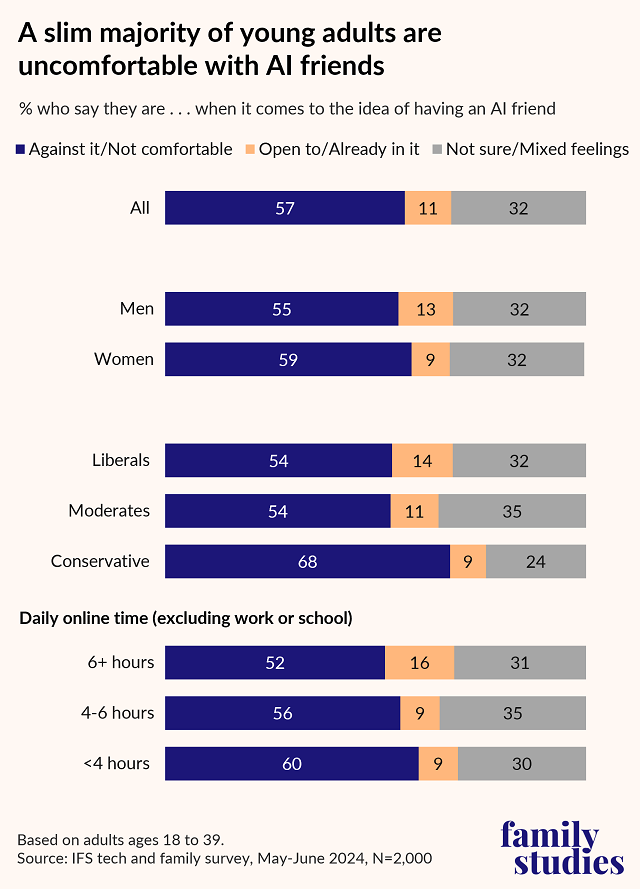
Meanwhile, how much time young adults spend online appears to influence their openness to AI friends. Excluding online activities related to work or study, young adults who spend an average of more than six hours online per day are much more likely to express openness to AI friendships than those who spend less time online. About 1 in 6 young adults (16%) who spend more than six hours online in their spare time say they are open to having an AI friend (including the 1% that already have one), compared with 9% of young adults who spend less time online.
7% of Single Young Adults Are Open to AI Romantic Partners
Among young adults who are not married or cohabiting, a small share (7%) say they see potential benefits and are open to having an AI romantic partner (including the fewer than 1% who already have one). A vast majority of young adults are not comfortable with the idea or are against it (71%); and 22% have mixed feelings or are unsure—again, representing the potential for a more significant uptake.
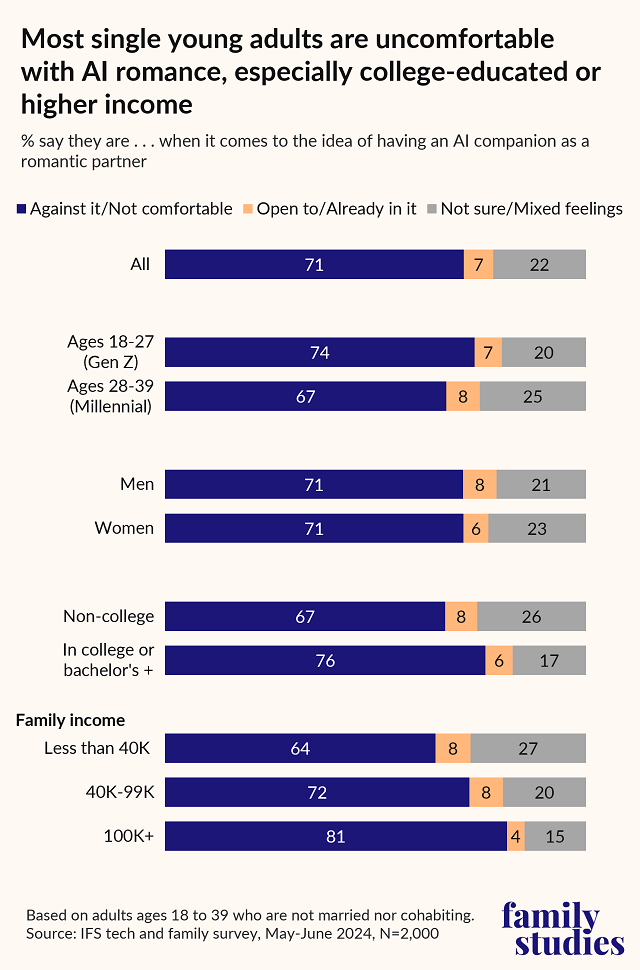
Interestingly, Gen Z adults without a romantic partner are more likely than unpartnered Millennials to oppose the idea of an AI romance (74% vs. 67%). Even though a similar share of Gen Zers and Millennials are open to it (7% vs. 8%), Millennials are more likely than Gen Zers to have mixed feelings about an AI girlfriend or boyfriend.
Education and income also play a role. College-educated young adults without partners (including those who are currently in college) are more likely than those without a college degree to disapprove of an AI romantic partner (76% vs. 67%). At the same time, unpartnered young adults with higher incomes are more likely than those with lower incomes to reject the idea of an AI romance. More than 80% of unpartnered young adults under age 40 with an income of $100,000 or more say they are either opposed to, or are uncomfortable with, the idea of an AI romantic partner, compared with 64% of young adults with incomes less than $40,000.
Can AI Replace Real-Life Romance?
One in four young adults believe that AI girlfriends and boyfriends have the potential to replace real-life romantic relationships, while most (75%) do not see AI as a viable replacement for human partners.
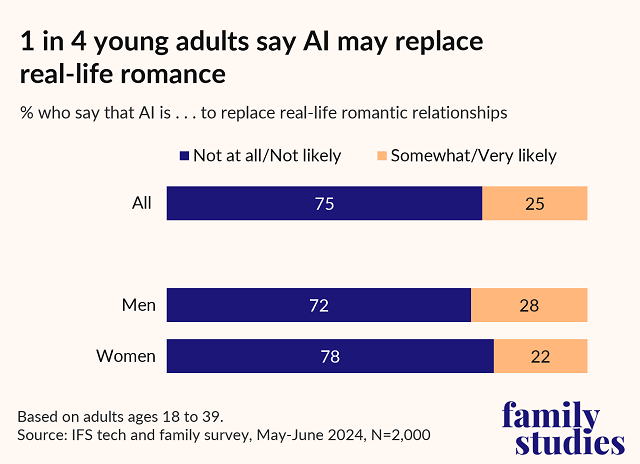
Young men are more likely than young women to believe that AI has the potential to replace real-life romantic relationships (28% vs. 22%). As shown earlier, young men are generally more open to AI friendships than young women, which parallels the gender difference in their views of AI’s potential for romance. Differences across other demographic categories, including age, education, income, and religion, are small and statistically insignificant.
Porn Use and Views of AI Romance
Pornography has become a part of online life for many young adults today. About 1 in 10 Americans under age 40 watch porn online at least once a day, and 34% watch it on at least a weekly basis, according to a recent study the IFS conducted. Young adults who use porn frequently are more likely to experience loneliness and depression than those who do not. It is possible that young adults who use pornography heavily are also more open to AI companionship, especially given that so-called “sexbots” are already widely used.
Among unpartnered young adults, heavy porn users turn out to be the group most open to the idea of an AI girlfriend or boyfriend. Among single young adults, those who watch porn online at least once a day are twice as likely as those who rarely, if ever watch porn to say they are open to an AI romance. More than 10% of heavy porn users say they are open to it (which includes the 1% of young adults in this group who already have an AI girlfriend or boyfriend).
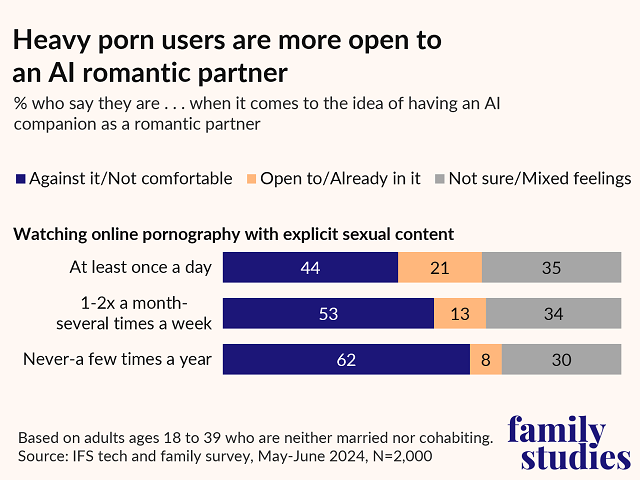
When asked about the future of AI in romantic relationships, heavy porn users are much more optimistic than others. More than one-third of heavy porn users (35%) believe that AI girlfriends or boyfriends have the potential to replace real-life romance, compared with 20% of young adults who rarely watch porn.
Heavy porn users are also more favorable toward having an AI friend in general. More than 1 in 5 young adults who view porn daily (21%) say they are open to having an AI friend (including the 3% who already have an AI friend), compared with those who never or rarely view pornography online (8%). Heavy porn users are the only group that we surveyed in which less than half hold negative views about an AI friend, with 44% saying they are either against or not comfortable with having an AI friend.
Young Adults’ Divided Views on AI’s Future
In addition to AI’s role in relationships, we also surveyed young adults on how they view AI’s potential future effect on society. We find that their reactions to AI are quite divided. About half of young adults under age 40 (55%) find AI technology threatening or concerning, while 45% find it either intriguing or exciting.
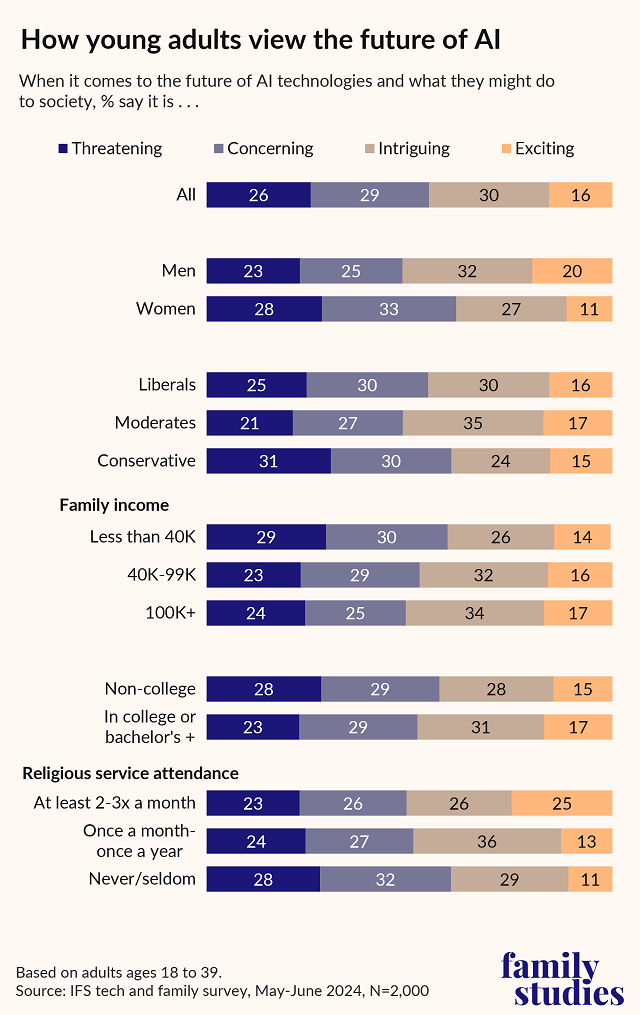
There is a sex divide in the attitude of young adults toward AI: Young women are much more likely than young men to perceive AI as a threat (28% vs. 23%) and are less likely to be excited about AI’s effect on society (11% vs. 20%).
Similarly, conservative young adults are more inclined to see AI as threatening or concerning compared to their liberal counterparts (60% vs. 55%).
Socioeconomic differences are also a factor, with young adults in lower-income families being more likely to view AI as a concern or threat compared to those from higher-income households (60% vs. 49%). Additionally, young adults without a college degree are more concerned about AI than those who are in college or who have already earned a bachelor’s degree (57% vs. 52%).
Lastly, secular young adults show more concern about AI than their religious peers (60% vs. 49%); they are also less intrigued or excited about AI’s role in society (40% vs. 51%).
Conclusion
In sum, these survey findings suggest that even though the majority of Gen Zers and Millennials are not yet comfortable with the prospect of an AI friend or romantic partner, a much higher share (25%) believe that AI could replace real-life romantic relationships in the future. There is also a significant share of the population that is unsure; meaning, we might just be seeing the beginning of a much larger social phenomenon. Young adults who spend more time online in their spare time are more likely to be open to AI companions in general. Further, young adults who are heavy porn users are the group most open to the idea of having an AI girlfriend or boyfriend—as well as an AI friendship.
Young women are much more likely than young men to perceive AI as a threat (28% vs. 23%) and are less likely to be excited about AI’s effect on society (11% vs. 20%).
There is an apparent class divide in how young adults view the future effect of AI on society. Young adults with lower incomes and less education are more likely to see AI technology as a destructive force in society. However, when it comes to the idea of having an AI romance, these young adults are more open to the idea than those with college education or higher income.
That 1% of American young adults in the survey report having an AI friend is significant because it marks the beginning of profound change in how we relate to one another: from a world where humans connect and form romantic bonds with each other to a world in which humans engage romantically with machines. The greater openness to AI relationships among those with a pornography addiction may strike some readers as obvious, if not telling. But the complex reaction to AI among lower-income Americans certainly raises important and pressing questions. Is it related to the decline of marriage among lower-income and less educated Americans, who might feel forced to be more open to AI romance but also naturally fear the consequences? Could this further the class divide in marriage and family life, in which romantic relationships between humans and robots will be stratified by income? These are necessary questions for further study and exploration.
Wendy Wang is Director of Research at the Institute for Family Studies and a former senior researcher at Pew Research Center. Michael Toscano is executive director of the Institute for Family Studies.
